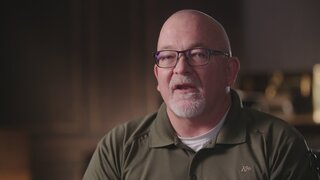‘It Was Overkill In Every Sense Of The Word’: Elderly Man Viciously Slain By Career Criminal
Kenneth Cross was 80 years old when he had a fatal run-in with a man who’d already been convicted of violent crimes.
On an ordinary day in 2008, a quiet neighborhood in Spokane, Washington was turned upside down by the shocking murder of one of their own.
Kenneth Cross, 80, was expected to make his daily trip to his girlfriend Anna Turnwall’s house on September 20, 2008, but he never showed up. Because it was unlike Cross to break plans without an explanation, his family quickly grew concerned and traveled to his house, where they had a neighbor go inside and look for him. What he found was worse than anyone imagined: Cross was dead inside of a bedroom closet and looked as if he’d been attacked.
The family quickly called in the authorities, who rushed over to inspect the gruesome scene: Cross had been shot in the head with a .22 caliber weapon and had sustained injuries to the head and face. There were also ample amounts of blood splattered on the walls of the closet and pooling on the floor.
Authorities quickly theorized someone had beaten Cross badly before killing him in his own home, but they had no idea who was behind the vicious crime.
“It was overkill in every sense of the word,” Det. Mike Drapeau, with the Spokane County Sheriff’s Office, told Oxygen’s “Buried In The Backyard,” airing Thursdays at 8/7c on Oxygen.
The authorities scoured the home for clues and quickly surmised someone had forced their way inside through the back door of the home. The basement had also been torn apart and it looked as if someone had tried to gain access to a locked box that was down there. Perhaps most telling, however, was the fact that his wallet was missing, which led investigators to suspect that a robbery had taken place. Police also believed it was likely that the robber had used one of Cross’ guns to hurt him, since his firearms were nowhere to be found.
While they didn’t yet have a suspect, detectives were able to gather from the victim’s injuries what connection the culprit may have had to him.
“The extent of injury to Kenneth Cross was extensive, so it appeared that whoever had assaulted and killed Kenneth Cross had a specific dislike of him,” Drapeau told producers.
As the investigation continued, authorities began looking into what Cross’ life was like before he died. He was generally well-liked by the community, but detectives soon learned there was at least one imperfect relationship in his life: Cross and Mike, the adult stepson who he’d raised for years, apparently did not get along. Mike, a 61-year-old Vietnam war veteran who was often unemployed, was described by others as a fan of handguns and someone who behaved in unpredictable ways. Still, Cross often gave his stepson money to help him get by, according to his family.
Investigators also learned that, before he died, Cross was scheduled to visit a lawyer to revise his will, and some in the family thought Mike, who’d lived with Cross before moving out after a huge fight, was concerned his stepdad would cut him out of his will altogether.
After learning this, authorities planned to bring Mike in for questioning, but he surprised them by showing up at the crime scene first with what looked like blood on his pants leg.
“We were just in shock,” Drapeau said.
After investigators asked Mike if it was possible that there was blood on his pants, he said that it was, and authorities confiscated the clothing as evidence. They then followed him back to his car to check for any further evidence, and found a hazmat suit in the trunk and a phone book with a bullet hole in it in the backseat. Even more surprisingly, the bullet hole seemed to have been made by a .22 caliber gun — the same kind of gun police believed was used to kill Cross.
Mike agreed to go to the station for questioning, where he admitted to having seen his stepfather on the day he was killed. He claimed that morning he’d gone to Cross’ house to bring him food and to talk to him, and that when he’d left some time later, Cross was there with his housekeeper, a woman named Teresa Nelson.
Due to the lack of evidence, investigators let Mike go, but then turned their attention to Nelson. They learned she’d been working for Cross for a couple of months, and Cross had concerns she’d been stealing from him. His girlfriend, who had only hired Nelson on one occasion, also believed Nelson was a thief who’d stolen a valuable ring from her home.
One fact, however, really captured investigators’ attention: Nelson’s boyfriend was a convicted burglar.
Armed with this knowledge, police tracked down Nelson at home. She, too, claimed to be innocent, and instead pointed to Mike as the person who was left alone in the house with Cross before he was killed. She also denied stealing from Anna Turnwall.
Days later, the results of Cross’ autopsy came in and shed light on his final moments. He’d been struck over two dozen times by a heavy object, cracking his ribs; he’d also been struck multiple times in the back of the head by something that was either a crowbar or something of a similar shape, and had been shot twice in the head with a .22 caliber pistol.
When police went to speak to Mike again, he agreed to let them search his home. He also admitted to not liking his stepfather but maintained that he was not the one who killed him. Then, despite what seemed like ample evidence against Mike, test results showed that his gun was not actually a match to the one used during the murder, a revelation which left police back at square one.
A week after Cross was killed, police talked to his neighbors again, and learned someone had seen Nelson’s car in his driveway at around 3:30 p.m., even though she should have been gone by that time. However, before approaching Nelson again, investigators wanted to build their case against her. They began by tracking Turnwall’s stolen ring to a local pawn shop, where they learned Nelson was indeed the one who’d pawned it. It was enough for an arrest warrant, but even though Nelson did finally admit to stealing the ring, she still denied having killed Cross.
A week after Nelson’s arrest, authorities received a tip from a man who owned storage units and who reported finding a lunchbox in one of the rented areas that was full of strange items. In the lunchbox was all the evidence authorities could ever need: Cross’ ID and other cards that were in his wallet, a pistol, and a pair of leather gloves. They also found blood-splattered boots and a crowbar nearby, as well as items that had been stolen from Cross’ house.
The man who called in the tip was concerned that the renter, a man named David Brewcznski, had been committing burglaries and hiding the evidence. Upon investigation, authorities found that Brewcznski did have a criminal history involving violence and burglaries, with one of those burglaries having been carried out at a home not far from Cross’ residence.
“My question is, how did David Brewcznski know about Kenneth Cross?” Det. Mike Ricketts, with the Spokane County Sheriff’s Office, told producers.
At that point, police suspected Nelson, whose boyfriend was a burglar, was the one to lead Brewcznski to Cross’ house. When confronted by police, Nelson wavered between admitting to knowing Brewcznski and claiming that she had no idea who he was at all.
Still, authorities had enough to arrest Brewcznski for a probation violation, and DNA testing provided a solid tie to the crime: Brewcznski’s DNA was found inside of the pair of boots in the storage unit, and it was Cross’ blood that was on the outside and on the soles of the shoes. His blood was also found on the gun.
Authorities believed Brewcznski had broken into Cross’ house while he was gone and was searching for valuables when Cross came home, found him, and confronted him; a struggle ensued, and Brewcznski beat and killed Cross.
Two weeks later, Brewcznski was charged with murder. Meanwhile, investigators were unable to find any evidence tying Nelson to the murder and were unable to charge her for anything besides the theft of the ring. At a trial a year later, a jury found Brewcznski guilty, and he was sentenced to life in prison. He took his own life less than two years into his sentence, however, in 2013.
For more on this case and others, watch “Buried in the Backyard” on Oxygen on Thursdays at 8/7c or stream online any time at Oxygen.com.

























